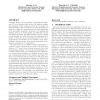163 search results - page 18 / 33 » Computationally Convincing Proofs of Knowledge |
ANLP
1994
13 years 9 months ago
1994
We present the advantages of guided sentences composition for communicating in natural language with computers. We show how guidance can be achieved by means of the partial synthe...
SIGCSE
2009
ACM
14 years 2 months ago
2009
ACM
Jeannette Wing’s call for teaching Computational Thinking (CT) as a formative skill on par with reading, writing, and arithmetic places computer science in the category of basic...
EUROCRYPT
2008
Springer
13 years 9 months ago
2008
Springer
Recently, Aumann and Lindell introduced a new realistic security model for secure computation, namely, security against covert adversaries. The main motivation was to obtain secure...
WPES
2005
ACM
14 years 1 months ago
2005
ACM
Radio Frequency Identification (RFID) technology raises significant privacy issues because it enables tracking of items and people possibly without their knowledge or consent. O...
FCT
2003
Springer
14 years 26 days ago
2003
Springer
We develop new proof techniques, based on non-interference, for the analysis of safety and liveness properties of cryptographic protocols expressed as terms of the process algebra ...

